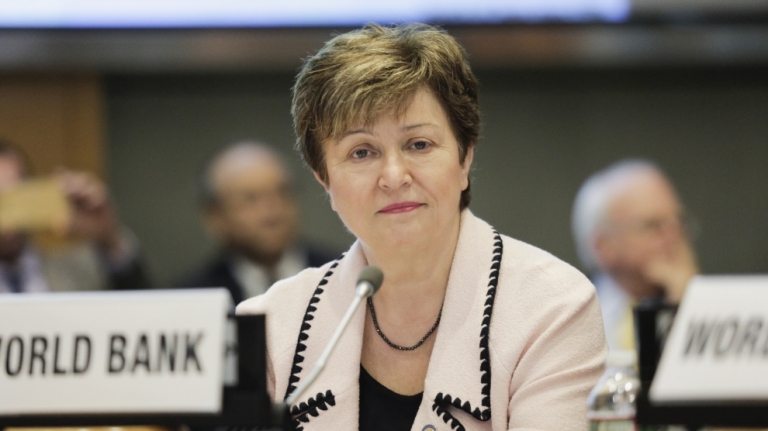Kristalina Georgieva, the Managing Director of the International Monetary Fund (IMF), has voiced serious concerns over the new U.S. tariffs, describing them as a significant risk to the global economy amid ongoing sluggish economic growth.
She expressed these concerns following Tuesday’s announcement of the tariff measures.
In her statement, Georgieva noted, “We are still assessing the macroeconomic implications of the announced tariff measures,” adding that these tariffs could negatively impact the global outlook at a time when the world economy is already struggling with slow growth.
The IMF chief stressed the importance of avoiding actions that could cause further harm to the global economy. She urged both the United States and its trading partners to engage in constructive dialogue to address the situation. “We appeal to the U.S. and its trading partners to work constructively to resolve trade tensions and reduce uncertainty,” she said, acknowledging that uncertainty in trade policies could hinder investment and economic growth.
Georgieva’s remarks come amid rising concerns over the impact of protectionist trade policies, which have historically led to retaliatory measures and disruption of global supply chains. This, in turn, can raise costs for businesses and consumers alike.
The U.S. recently announced a 14% tariff on goods from Nigeria, which is part of President Trump’s broader protectionist trade policy. The move, which took effect immediately, includes duties on key Nigerian exports like agricultural products and manufactured goods. The announcement has led to turbulence in financial markets, with Wall Street, European indices, and Asian markets all experiencing volatility. The U.S. President has argued that Nigeria has unfairly benefited from U.S. trade policies, contributing to trade tensions over the past several months.
While the specifics of these tariffs are still being analyzed, similar measures in the past have led to tensions with major trading partners, such as China and the European Union, who may respond with countermeasures. The IMF has long warned against the escalation of trade restrictions, having previously highlighted how global trade tensions have already hindered economic recovery from the COVID-19 pandemic.
In response to the growing concerns, Georgieva confirmed that the IMF will release a full assessment of the impact of the tariffs in its World Economic Outlook, which will be published during the upcoming IMF/World Bank Spring Meetings. These meetings, scheduled for later this month, will bring together global financial leaders, with trade tensions likely to be a key topic of discussion.
READ ALSO: Joy Raimi Mojisola Crowned Miss World Nigeria 2025
Economists and financial analysts will be closely monitoring the IMF’s assessment, as it will provide vital insights into how the tariffs might affect inflation, global trade flows, and overall economic growth. Many experts have warned that increasing trade barriers could stifle economic progress, citing potential disruptions in supply chains and rising costs that could further strain fragile economies.
This tariff announcement also comes at a time of broader concern about the global economic health, with inflation rising in several major economies and tightening monetary policies putting additional pressure on economic stability. Critics argue that such tariff measures could have unintended negative consequences, particularly for global growth.
While U.S. officials defend the tariff policies, stating they are necessary to protect domestic industries, the IMF has consistently advocated for open trade and multilateral cooperation. The IMF believes that removing trade barriers and resolving disputes through negotiation is key to maintaining global economic stability and promoting growth.
With the global economy still recovering from multiple shocks, many leaders are calling for restraint to prevent further escalation. As the IMF continues to assess the situation, its forthcoming analysis will be crucial in shaping international trade policy discussions. The findings will help determine whether the new U.S. tariffs will exacerbate global economic uncertainty or if diplomatic efforts can reduce potential disruptions.
Ultimately, the hope remains that constructive engagement between nations will prevent the escalation of trade conflicts. The IMF’s call for cooperation emphasizes the importance of balanced approaches to managing global trade tensions and fostering economic stability.


